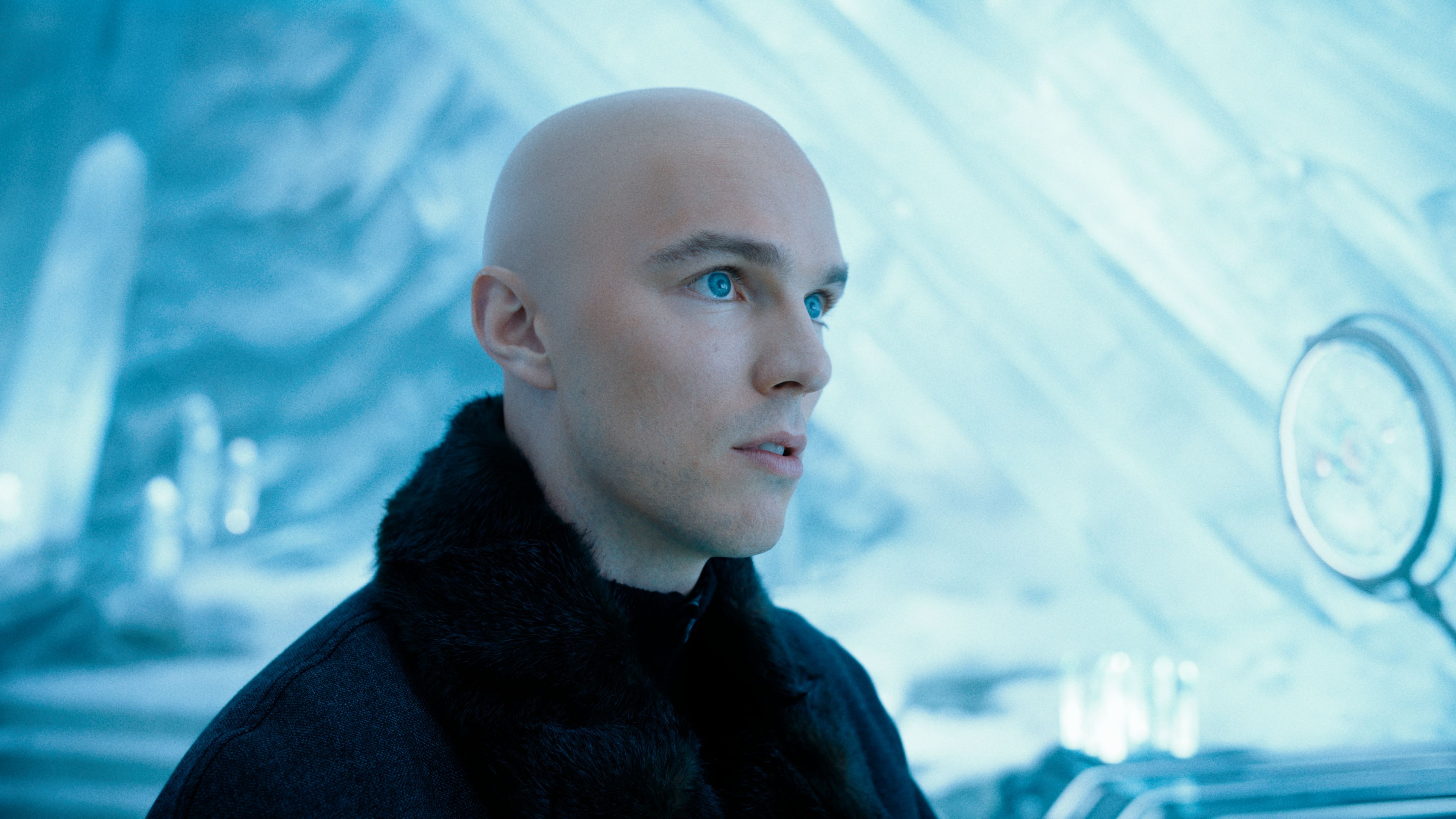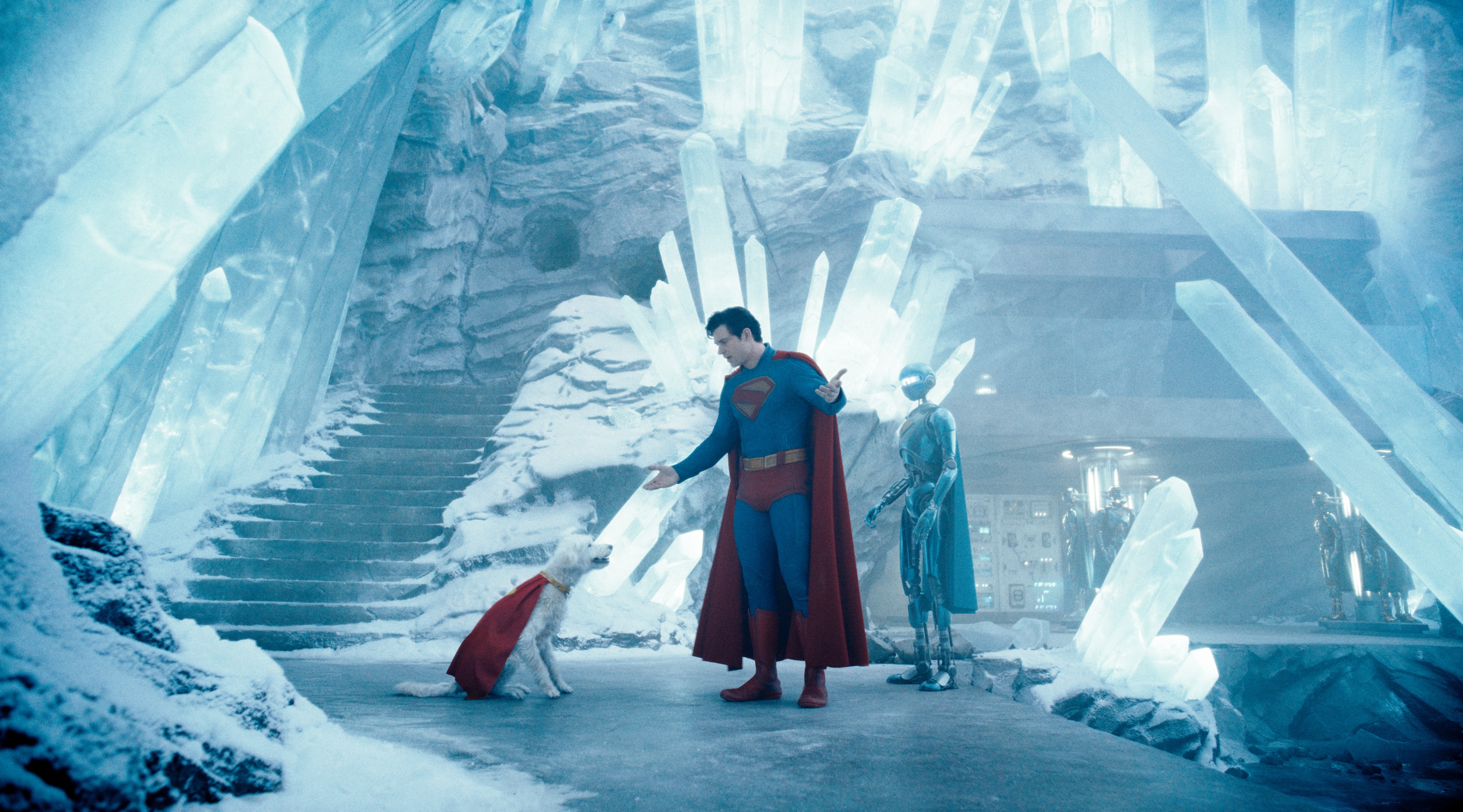A three-century-spanning countdown rapidly ticks to a version of now, and a beaten Superman (David Corenswet) ploughing into Arctic snow. His super-whistle fetches Superdog Krypto to excavate him like a favourite bone, and drag him to crystalline sanctuary the Fortress of Solitude.
James Gunn’s vision for this fourth modern cinema Supes and DC Universe launch embraces the character’s simplicity and silliness as Zack Snyder constitutionally couldn’t. But by leaving the familiar origin largely implicit in a tale set three years into Superman’s adventures, the DCU’s hoped for new dawn already feels halfway done.
Superman suffered his bruising defeat to the mysterious Hammer of Boravia, catspaw of Lex Luthor (Nicholas Hoult, pictured below), whose genius maps and beats his every move. Luthor’s visceral loathing of this alien who has knocked his brilliance and humanity itself down an evolutionary rung is more adult than Gene Hackman and Kevin Spacey’s sardonic incarnations. Later scenes of an invaded, infantilised Asian nation chanting Superman’s name inadvertently indicate Lex has a point. A real omniscient, omnipotent hero would reduce mankind to a cat up a tree. Even Lois Lane (Rachel Brosnahan, channelling Seventies Lois Margot Kidder and Annie Hall in her black waistcoat and slacks) has a few questions about her lover Superman’s MO when he stops by for dinner. Corenswet handles this dialogue-heavy scene well, and he was striking as a movie star-handsome, morally ambiguous seducer in the 1920s-set horror treat Pearl (2022). He only intermittently convinces as Clark-Superman, though, tripping over his stated concept of an intimidatingly big man trying to act small into near woodenness.
Even Lois Lane (Rachel Brosnahan, channelling Seventies Lois Margot Kidder and Annie Hall in her black waistcoat and slacks) has a few questions about her lover Superman’s MO when he stops by for dinner. Corenswet handles this dialogue-heavy scene well, and he was striking as a movie star-handsome, morally ambiguous seducer in the 1920s-set horror treat Pearl (2022). He only intermittently convinces as Clark-Superman, though, tripping over his stated concept of an intimidatingly big man trying to act small into near woodenness.
Krypto defines Gunn’s USP, embracing Fifties Superman’s crackpot, child-friendly surrealism and the homespun goodness of Richard Donner’s 1978 film over Batman’s gloomy shadows. The irreverent hip and warm wit he was poached from Marvel for is shown in a background super-battle in Metropolis’s skies as the Justice Gang whack a cosmic imp with a slapstick imaginary hammer, silent comedy seen through Lois’s window as Superman kicks back.
Gunn took inspiration from Grant Morrison’s All-Star Superman comics, whose Frank Quitely art restored the character’s primary-coloured wonder while Morrison’s funny, loving scripts made him a dying sun-god with poignantly contrasting farm-boy goodness. Morrison merged the mythic and human – Christ-like, All-American Everyman and Clark Kent klutz – into a moving restatement of Superman’s value. A film scene when a grateful civilian saves Superman is pure Morrison, but Gunn imbibes vibe more than plot. This Superman vows “to serve humanity” not the American way, but he’s inseparable from his country’s virtues and vices. Frank Miller’s comic The Dark Knight Returns made him an agent of Reaganite foreign policy, a super-Cruise missile subjugating El Salvador. Ohio-raised Jewish-Americans Jerry Siegel and Jerry Shuster’s 1938 creation of an alien crash-landing in the Midwest and assuming its values to become America’s perfect hero is much remarked immigrant wish-fulfilment. Gunn’s Superman sees him reduced to a rightless enemy alien, consigned to Luther’s super-prison in a stygian pocket universe worse even than Trump’s Alligator Alcatraz. Still, Superman’s Krypton legacy proves suspect next to Ma and Pa Kent’s heartland ways, confirming his naturalisation and Gunn’s unifying American intent.
This Superman vows “to serve humanity” not the American way, but he’s inseparable from his country’s virtues and vices. Frank Miller’s comic The Dark Knight Returns made him an agent of Reaganite foreign policy, a super-Cruise missile subjugating El Salvador. Ohio-raised Jewish-Americans Jerry Siegel and Jerry Shuster’s 1938 creation of an alien crash-landing in the Midwest and assuming its values to become America’s perfect hero is much remarked immigrant wish-fulfilment. Gunn’s Superman sees him reduced to a rightless enemy alien, consigned to Luther’s super-prison in a stygian pocket universe worse even than Trump’s Alligator Alcatraz. Still, Superman’s Krypton legacy proves suspect next to Ma and Pa Kent’s heartland ways, confirming his naturalisation and Gunn’s unifying American intent.
The director’s patented light touch lets him down in a crowded narrative further hampered by Corenswet’s emotionally distant portrayal. It comes to feel like just another Superman movie in another superhero universe. It’s still moving because of the essence Morrison mainlined and Gunn truly believes in – of a benign, innocent and kind American hero born in the New Deal, and barely changed.













Add comment